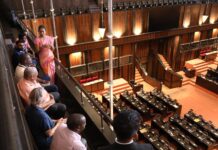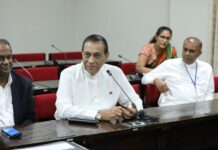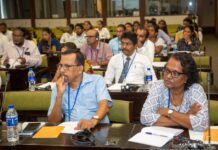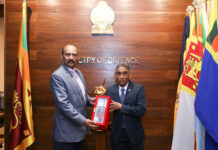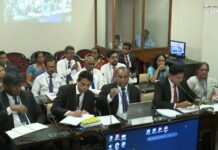Sri Lanka’s Navy has taken into custody eight boats with 351 migrants on board in May 2022 in mainly off the eastern coast, as desperate people attempt to escape soaring inflation as the currency collapsed after two years of money printing by the central bank.
Helping migrants leave, now called human-smuggling has become a booming business once again as many Sri Lankans want to leave the country due to a gloomy economic and political outlook, political analysts say.
Police sources said most of the desperate migrants Sri Lankan migrants are aiming to make it to Australia.
Since the first boat was intercepted by the Navy on May 18 with 40 people onboard in the seas off the eastern Batticaloa district, Sri Lanka’s security establishment have arrested 67 people in the waters off Trincomalee, Eastern province, another boat with 26 illegal migrants in the southern seas and another 19 in a boat off the Western province.
Four boats taken by the navy and other security forces in May.
It is not clear under which law the boats were stopped as Sri Lanka is not a dictatorship which require exist visas for movement. East Germany used to shoot people attempting to cross to the West.
According to the Universal Declaration of Human Rights on freedom of movement (a) Everyone has the right to freedom of movement and residence within the borders of each state and (b) Everyone has the right to leave any country, including his own, and to return to his country.
Article 12 of the ICCPR also guarantees the right of person to leave without exit visas and has unrestricted rights for a citizen to return.
However countries like Australia has been giving technical support for Sri Lanka navy to block the movement of people.
The Australian embassy in Sri Lanka tweeted on June 6: “A timely reminder that whilst Australia has a new government, its border protection policies have not changed. #ZeroChance“.
A timely reminder that whilst Australia has a new government, its border protection policies have not changed. #ZeroChance pic.twitter.com/1ZP0LM2KxS
— Australia in Sri Lanka and Maldives (@AusHCSriLanka) June 6, 2022
The out migration trend continued as Sri Lanka’s economic crisis worsened with growing queues for essentials and skyrocketing prices of food making basic foods unaffordable even for middle income people.
Thousands are at risk of losing employment as many private companies are facing closures due to lower demand and a lack of financing to sustain the businesses.
However police say there may be scams.
“Most of these illegal migrants have paid millions of rupees for their journey,” a police officer who is aware of the probe into the recent migration trend told EconomyNext.
“Nobody knows if it will be a success. Even if they go beyond Sri Lankan waters, it will be extremely difficult for them to do the same with other country’s coastguards,”
In June, however, undocumented migration attempts continued, with 15 arrested in a boat off the Western coastal town of Marawila and another 76 from the nearby town of Chilaw.
Yet another boat with 38 illegal migrants onboard was stopped by the navy in the seas off the Eastern district of Ampara followed by 64 people attempting to flee the country who were arrested in the waters off Trincomalee on Wednesday.
Analysts had warned earlier that the Keynesian stimulus for output gap targeting under flexible inflation targeting will lead to boat people and social unrest. (Sri Lanka’s monetary meltdown will accelerate unless quick action is taken)
Some Sri Lankans living in the island’s Northern province have already arrived in neighbouring India’s southern shores using similar methods.
These migrants have not been repatriated by India, unlike in the case of Australia.
Undocumented migration was on the rise in 2013-2014 due to economic hardships and Australia came forward to finance boats and training for the island nation’s navy and coastguards to prevent such attempts.
Australia has come under fire from rights groups of some of its practices on undocumented migrants.
Millions of Sri Lankans mainly ethnic minority Tamils have taken asylum during and after a three decade war claiming that they were unable to live peacefully in the country.
They have settled now in Europe, the United Kingdom, Australia, India, the United States, and Canada.




